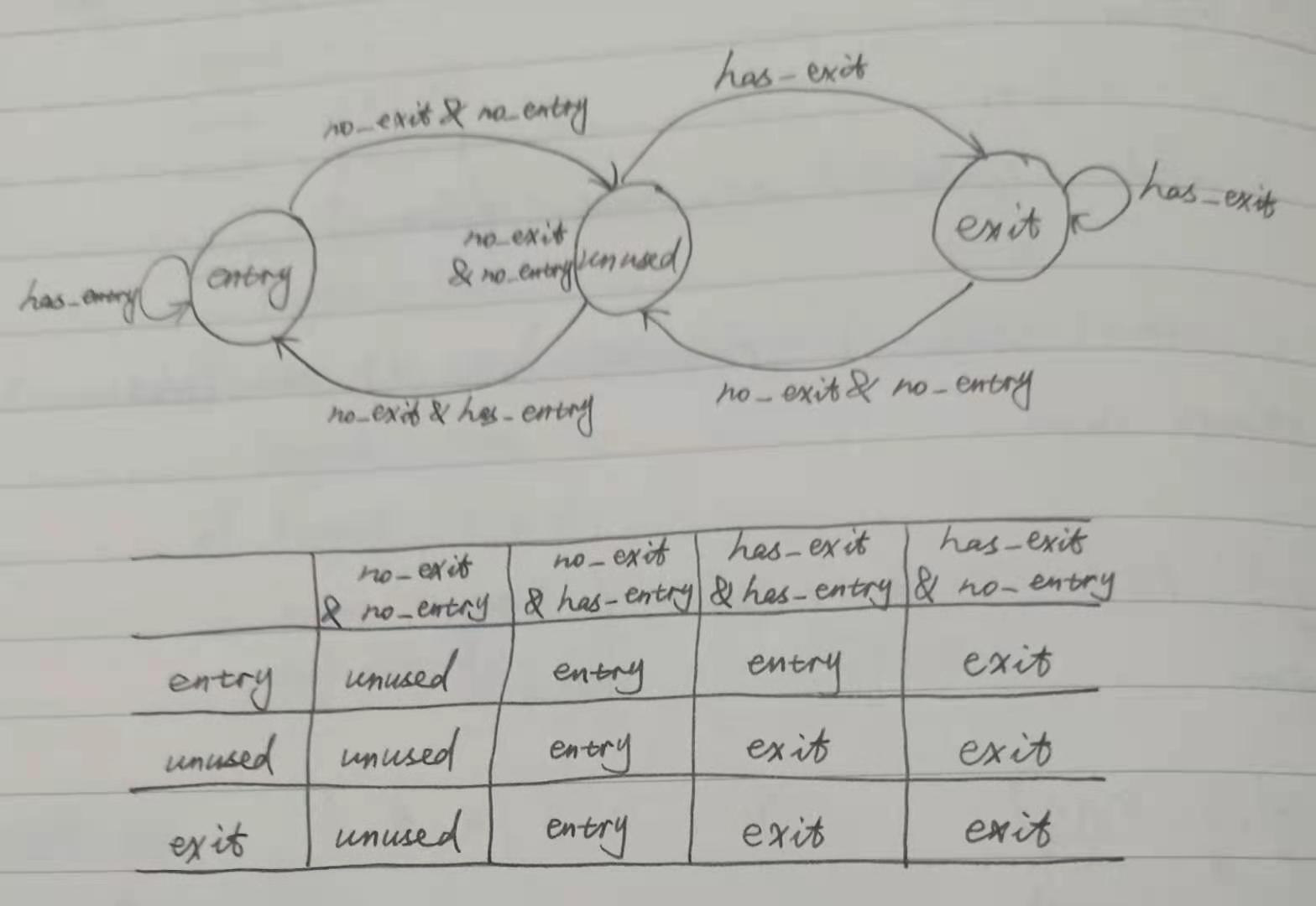Turnstile
A small store having exactly one turnstile. It can be used by customers either as an entrance or an exit. Sometimes multiple customers want to pass through the turnstile and their directions can be different. The ith customer comes to the turnstile at time[i] and wants to either exit the store if direction[i] = 1 or enter the store if direction[i] = 0. Customers form 2 queues, one to exit and one to enter. They are ordered by the time when they came to the turnstile and, if the times are equal, by their indices.
If one customer wants to enter the store and another customer wants to exit at the same moment, there are three cases:
If in the previous second the turnstile was not used (maybe it was used before, but not at the previous second), then the customer who wants to exit goes first. If in the previous second the turnstile was used as an exit, then the customer who wants to leave goes first. If in the previous second the turnstile was used as an entrance, then the customer who wants to enter goes first. Passing through the turnstile takes 1 second. Write an algorithm to find the time for each customer when they will pass through the turnstile.
Input The input consists of three arguments:
numCustomers : an integer representing the number of customers (n)
arrTime: a list of integers where the value at index i is the time in seconds when the ith customer will come to the turnstile
direction: a list of integers where the value at index i is the direction of the ith customer
Output Return a list of integers where the value at index i is the time when the ith customer will pass the turnstile.
Constraints:
1 <= numCustomers <= 10^5
0 <= arrTime[i] <= arrTime[i + 1] <= 10^9
0 <= i <= numCustomers - 2
0 <= direction[i] <= 1
0 <= j <= numCustomers - 1
Examples
Example 1:
Input:
numCustomers = 4
arrTime = [0, 0, 1,5]
direction = [0, 1, 1, 0]
Output: [2,0,1,5]
Explanation:
At time 0, customer 0 and 1 want to pass through the turnstile. Customer 0 wants to enter the store and customer 1 wants to exit the store. The turnstile was not used in the previous second, so the priority is on the side of the customer 1
At time 1, customers 0 and 2 want to pass through the turnstile. Customer 2 wants to exit the store and at the previous second the turnstile was used as an exit, so the customer `2 passes through the turnstile.
At time 2, customer 0 passes through the turnstile.
At time 5, customer 3 passes through the turnstile.
Example 2:
Input:
numCustomers = 5
arrTime = [0,1,1,3,3]
direction = [0, 1, 0, 0, 1]
Output: [0, 2, 1, 4, 3]
Explanation:
At time 0, customer 0 passes through the turnstile (enters).
At time 1, customers 1 (exit) and 2 (enter) want to pass through the turnstile, and customer 2 passes through the turnstile because their direction is equal to the direction at the previous second.
At time 2. customer 1 passes through the turnstile (exit).
At time 3, customers 3 (enter) and 4 (exit) want to pass through the turnstile. Customer 4 passes through the turnstile because at the previous second the turnstile was used to exit.
At time 4, customer 3 passes through the turnstile.

from collections import deque
class Automaton:
def __init__(self, n):
self.state = 'unused'
self.table = {
'entry': ['unused', 'entry', 'entry', 'exit'],
'unused': ['unused', 'entry', 'exit', 'exit'],
'exit': ['unused', 'entry', 'exit', 'exit']
}
self.entry = deque([])
self.exit = deque([])
self.ans = [-1] * n
def get_col(self):
if not self.entry and not self.exit:
return 0
if self.entry and not self.exit:
return 1
if self.entry and self.exit:
return 2
if not self.entry and self.exit:
return 3
def through(self, second):
self.state = self.table[self.state][self.get_col()]
if self.state == 'entry':
if self.entry:
value, index = self.entry.popleft()
self.ans[index] = second
elif self.exit:
value, index = self.exit.popleft()
self.ans[index] = second
else:
if self.exit:
value, index = self.exit.popleft()
self.ans[index] = second
elif self.entry:
value, index = self.entry.popleft()
self.ans[index] = second
def get(self, seconds, time, direction):
for second in range(seconds + 1):
for index, value in enumerate(time):
if value > second:
continue
if value == second:
if direction[index] == 1:
self.exit.append((value, index))
else:
self.entry.append((value, index))
self.through(second)
# new people not come any more
second = seconds
while self.exit or self.entry:
second += 1
self.through(second)
class Solution:
def turnstile(self, n, time, direction):
seconds = max(time)
automaton = Automaton(n)
automaton.get(seconds, time, direction)
return automaton.ans
solution = Solution()
print('case1:', solution.turnstile(4, [0, 0, 1, 5], [0, 1, 1, 0]))
print('case2:', solution.turnstile(9, [1, 1, 3, 3, 4, 5, 6, 7, 7], [1, 1, 0, 0, 0, 1, 1, 1, 1]))
print('case3:', solution.turnstile(5, [0, 1, 1, 3, 3], [0, 1, 0, 0, 1]))